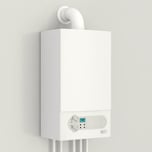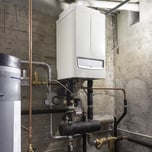Answer these simple questions and we will find you the BEST prices
Which type of solar quotes do you need?
It only takes 30 seconds
100% free with no obligation

Get up to 3 quotes by filling in only 1 quick form

Slash your energy bills by installing an energy efficient boiler

We’ve helped over 500,000 homeowners reduce their carbon footprint
- GreenMatch
- Boilers
Boilers in the UK: Different Types, Brands and Prices

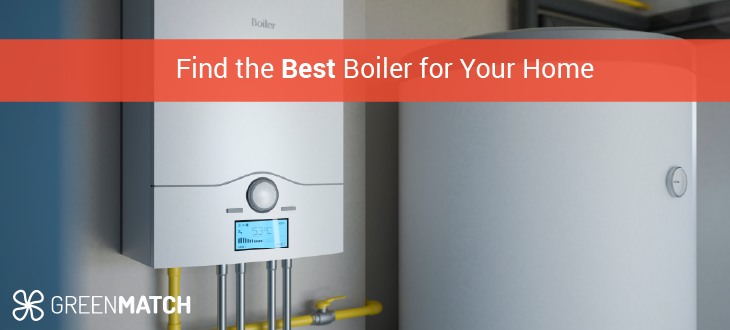
If you’re looking for a home heating option that’s effective and affordable, then a boiler may be the best choice for you.
We understand that renewable heating systems, like heat pumps, can be an expensive investment. If you’re not ready to commit to such a high price tag, there are boiler options available that mean you can still heat your home and be energy efficient.
Our complete guide below will help you decide what the best boiler is for your circumstances and how they can be adapted to reduce the environmental impact.
How do Boilers Work?
There are three basic boiler types, (combi, system and regular) and while each of them work slightly differently, they all follow a similar process to heat your water and central heating.
Below is an example of how the most common boiler type, the combination boiler (or combi) works:
- Cold water is fed into the boiler directly via the mains
- The water goes through the boiler and is heated by an element called a heat exchanger
- The hot water is then sent either to the water outlets or radiators. There is a part in the boiler called a ‘diverter’ which recieves signals either from your thermostat or when you turn on a tap, which directs the hot water to where you want it.
- The water that is sent to radiators, travels through them is sent back to the boiler to be reheated and used again.
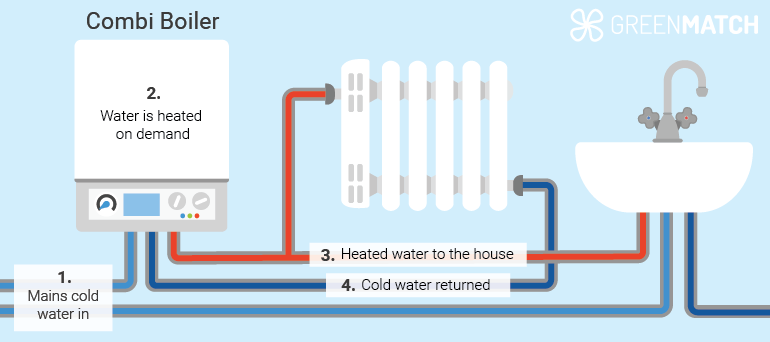
Depending on your boiler type certain parts of the process will be different. For example, although a combi boiler takes in the cold water directly from the mains, a regular boiler has a large tank in the loft full of cold water which flows down to the boiler.
No matter which type you choose though, most modern boilers are now much more energy efficient than they have even been in the past. Manufacturers and government bodies are increasingly pushing innovative technology to try and future proof boiler products.
For example, combi boilers, since 2015 are legally required to use condensing technology. This is an inbuilt system which recycles any waste heat that the boiler produces, that would usually escape from the flue pipe, and sends it back in to the boiler cycle.
Manufacturers are also using new technologies to prolong the life of boilers, to reduce waste. One way they encourage this is by including magnetic filters with the purchase of a boiler, which helps to keep internal pipework clear and working efficiently. Many of the top brands also include lengthy warranties and services, to keep your boiler in perfect working condition and reduce the risk of it losing its efficiency.
If you’re unsure of which boiler will best suit your needs, we recommend getting advice from a professional engineer. To save you time and effort, this is something we can help with. Our free quotes service can put you in touch with up to 3 Gas Safe registered engineers, who can guide you on the best boiler options and give you free, no-obligation quotes to compare. That way you can ensure you find the best deal, without the hassle of having to research reputable engineers, read endless reviews and wait around hoping someone will contact you.
To get started, simply click the link below and fill in our form today.
- Quotes from local engineers
- Payment by finance available
- Save up to £975
It only takes 30 seconds



What are the Different Boiler Fuel Types?
Most boiler types are available in models which allow you to use alternative fuels. For example, if you wanted to avoid the use of natural gas and seek out a lower carbon option, there are electric boilers available, which don’t produce any emissions. The big consideration with these, however, is that most electricity produced by major suppliers is still made by burning fossil fuels.
Issues like this can be overcome with the ability to connect some boiler brands to renewable energy sources, like solar panels. However, there are still a lot of considerations to make when thinking about boiler fuels. Not just in terms of environmental impact, but also the costs and whether it’s accessible to your area and suitable for your home.
Your power source also needs to match the power requirements of the boiler and the needs of your home. To determine that, you'll need to consider the type of fuel input and determine what size boiler you need.
If you want a more extensive overview of fuel types, along with boiler types and sizes, you can watch the video below:

Gas boilers
Natural gas is the most popular and widely used boiler fuel in the UK. This is for two reasons, firstly most homes are already connected to the national gas grid, making it the simplest option logistically. Secondly, when compared to most other fuels, gas has historically been the cheapest option.
As things change globally, prices between fuels fluctuate, but as gas has always been the most convenient, it’s what you will find most homes use. Nevertheless, you may want to consider alternatives to gas boilers.
Thinking about the future, and greener options, you might be surprised to know that your gas boiler may be ready for radical changes. Most modern boilers are now built to be hydrogen ready. Whilst the use of a hydrogen and gas fuel blend is still being developed, it is hoped that this could be the answer to converting most homes in the UK to a more sustainable fuel option.
There would be no need to upgrade your boiler either, as existing boilers connected to the gas grid could receive the blended gas in the same way it usually would. It would mean no additional spend and there would be no disruption to your service.
If you’re interested in this option, be sure to look out for a boiler that is ‘20% Hydrogen Ready’.
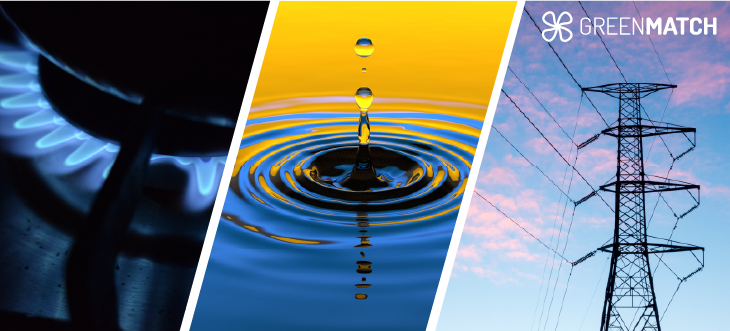
Another option for homes using system or regular boilers, which require an additional hot water storage tank, is to consider connecting the cylinder to a renewable energy source, such as solar power, to run the hot water tank. Whilst this doesn’t mean your whole system will be renewable, it is an option to reduce your impact on the environment.
Oil boilers
For those whose homes are in more rural areas, or are not connected to the gas grid, there is the option to use oil. This is seen as the best choice if you cannot access gas.
There are some considerations however, as oil needs to be stored in a separate tank somewhere on the property and does need to be manually refuelled.
Depending on the type of boiler you need, you may be able to combine an oil boiler with a renewable fuel source, if you have a solar or wind compatible hot water storage tank.
Electric boilers
Electric boilers are often seen as the best fuel source for a boiler, because they do not emit any harmful gases. However, because they run solely on electricity they are technically running on fossil fuels, and this actually makes them less favourable as a renewable option.
Many energy suppliers in the UK are currently working to produce completely renewable electricity. Whilst that will make electric boilers a great option in the future, it’s fair to say that they aren’t particularly good for the environment, at this time. For more information on this topic, you can check our electric boiler vs gas boiler article.
When you’re considering your boiler options, if environmental impact is important to you, it is worth looking closely at the following:

If you’re struggling to decide which boiler will tick your boxes, we highly recommend speaking to a qualified engineer. To save you time trawling the internet, trying to find someone you can trust, we can do that for you!
By filling in our quick and easy form, we can connect you with up to 3 Gas Safe registered engineers who can give you the very best advice and quote for your new boiler. By receiving multiple quotes, you can compare rates and be sure you’re not over paying. All quotes are free and there’s no-obligation to accept any of them.
Click the link below to get started!
- Quotes from local engineers
- Payment by finance available
- Save up to £975
It only takes 30 seconds



What are the Different Boiler Types?
There are 3 main boiler types, each one is suitable for a different type of home and they all have their own unique benefits.
Regular boiler
These boilers are also known as ‘conventional’, ‘traditional’ or ‘heat only’ boilers. They are the oldest boiler style and are usually only found in old houses. The reason they are called ‘heat only’, is because that’s all they do.
The boiler unit itself can only provide heat for your radiators, and therefore an additional hot water tank is needed to supply your domestic hot water.
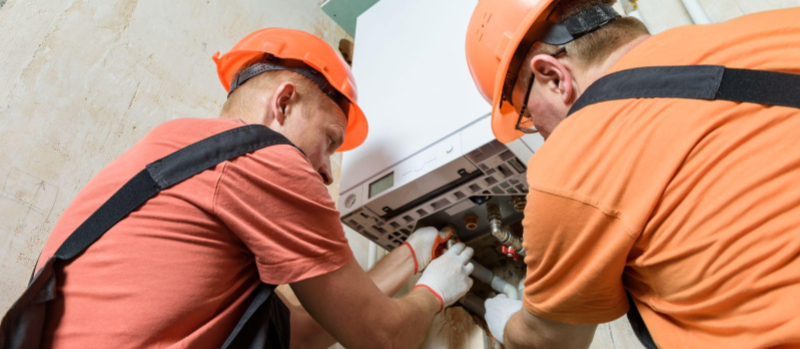
The regular boiler is very space hungry, as there are 3 separate elements. First you need somewhere for the boiler unit, then additional space for the hot water tank. The third, and largest, element is the cold water feed tanks which are installed in the loft. These are what feed the regular boiler its water supply. For these reasons, it’s not the first choice for most homeowners.
Regular boilers are best used in large homes with plenty of space, and a high hot water demand. They are not, however, recommended unless they are being installed as a direct replacement for an existing regular boiler, as they need a lot of pipework and installation will take time, costing you extra.
System boiler
System boilers are the ideal choice for anyone with a medium-large sized home and a high hot water demand (meaning multiple bathrooms and lots of people).
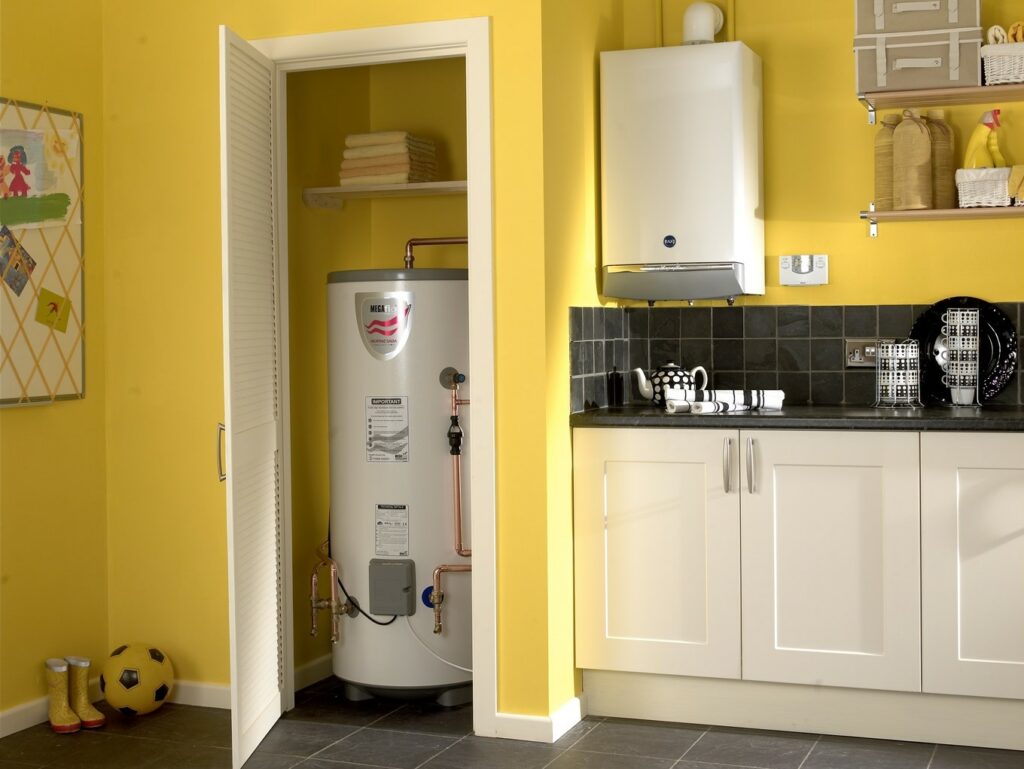
System boilers are the upgraded, preferred, options to the regular boiler as they can supply for the same demand, but they take up less space and need much simpler pipework. This is because, unlike the regular boiler, they take their water supply from the mains and eliminate the need for a feed tank in the loft.
However, they also need a hot water storage tank to meet the higher demand. System boilers can easily be considered the best boilers for a large house.
Combination boiler
The combination, or ‘combi’, boiler is by far the most popular boiler choice. This is because a combi boiler doesn’t need a hot water tank, and in fact heats your hot water and central heating all from the same unit.
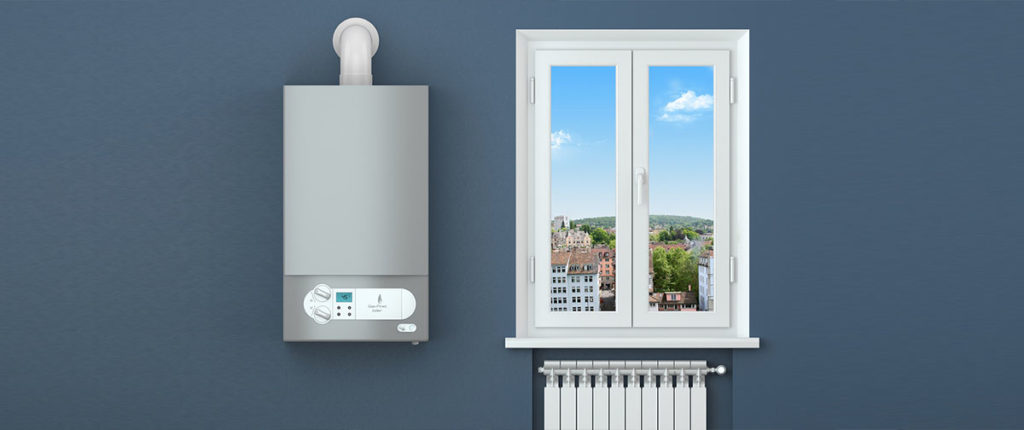
This means a combi is compact, easy to install and takes up less space. It also means it is the quickest and cheapest boiler to have installed. The only thing to note however, is that combi boilers are not always powerful enough to provide for a very high hot water demand. This makes them better situated to small-medium size homes with less than 2 bathrooms.
Top 5 Boiler Manufacturers in the UK
When looking for a new boiler for your home, it can be helpful to research the very best in the UK as a starting point. To help with these, we’ve listed the top 5 boiler manufacturers, as below:
Each of these brands have been in the boiler production business for decades. They are all creators of unique boiler models with a keen investment in future proofing and increasing efficiency.
Each brand has made the top 5 because of their product reliability, customer service ratings, great warranties and excellence awards.
They all offer a wide range of boiler types and models, so you are guaranteed to find something suitable for your specific needs. If you’re unsure what it is you need however, we recommend speaking to a qualified boiler engineer who can give you the best advice and help you get a great deal.
If you would like to avoid the hassle of tracking down reputable engineers and trawling through endless prices, we can help. All you have to do is fill in our simple form and we will find you up to 3 Gas Safe or OFTEC registered engineers in your local area, who can provide you with free no-obligation quotes. Why wait?
- Quotes from local engineers
- Payment by finance available
- Save up to £975
It only takes 30 seconds



Domestic Boiler Prices in the UK
Boiler prices will vary depending on the unique circumstances of your home, for example, which boiler type you need, how powerful it needs to be and which fuel type you choose. For example, the cost of a new boiler for a 4 bedroom house is anywhere between £980 and £2,800 without installation while a boiler for a 1 bedroom house will cost less as it needs less power output to meet the heating needs.
When considering a boiler, you also need to note that boiler installation costs are not usually included within the unit price. Installation can cost anywhere from £500-£1000 in addition to the price of the boiler and any additional parts or system services required.
As a guide, we’ve listed some estimated prices from the best boiler manufacturers below. These prices do not include installation and are based on gas boilers only.
Combi | System | Regular | |
Worcester Bosch | £730 - £2,475 | £899 - £3,837 | £814 - £2,300 |
Vaillant | £907 - £1,703 | £894 - £2,700 | £792 - £1,533 |
Ideal | £714 - £1,354 | £785 - £1,264 | £712 - £4,500 |
Baxi | £549 - £1,482 | £711 - £1,150 | £663 - £1,075 |
Viessmann | £1,125 - £2,975 | £995 - £1,650 | £845 - £1,200 |
These figures are only intended as a guide, but to get the very best price on a new boiler we recommend comparing quotes from multiple Gas Safe registered engineers. This way you can receive the best advice and also ensure you find the best deal.
Finding quotes and tracking down reliable engineers can be a stressful task, but we’re here to help. Just fill in our simple form and we’ll do the leg work for you. We will find you comparison quotes from up to 3 professional engineers in your local area. It’s free and you don’t need to accept any of the quotes you receive - it couldn’t be easier!
Get started by clicking the link below.
- Quotes from local engineers
- Payment by finance available
- Save up to £975
It only takes 30 seconds



FAQ
Boilers can come in various models, but the most popular is a gas combi boiler. This is due to their compact size and high level efficiency. Find out more about gas boilers and other fuel options.
Modern boilers can last between 10-15 years. With some of the main manufacturers offering lengthy warranties with their boilers, of up to 12 years, you can be sure to get many reliable years from a new boiler. Learn more about the top UK manufacturers.
There are three main types of boiler: combi, system and regular. Each have their own benefits and suitabilities. Discover which boiler type suits your circumstance.
The boiler market is always expanding, with efficient, reliable and award winning models being found across manufacturers. The best way to check reliability is to see what warranty length the manufacturer offers. Some will offer up to 12 years cover, which shows just how much they trust their products to last. Take a look at the best manufacturers, to find reliable boiler options.
Every home is unique and will require a certain boiler type depending on factors such as house size, number of bathrooms and number of radiators. To find the best boiler for your home, read more about the types of boilers available.

Becky is an experienced SEO content writer specialising in sustainability and renewable trends. Her background in broadcast journalism inspires reliable content to help readers live more sustainably every day.
We strive to connect our customers with the right product and supplier. Would you like to be part of GreenMatch?




